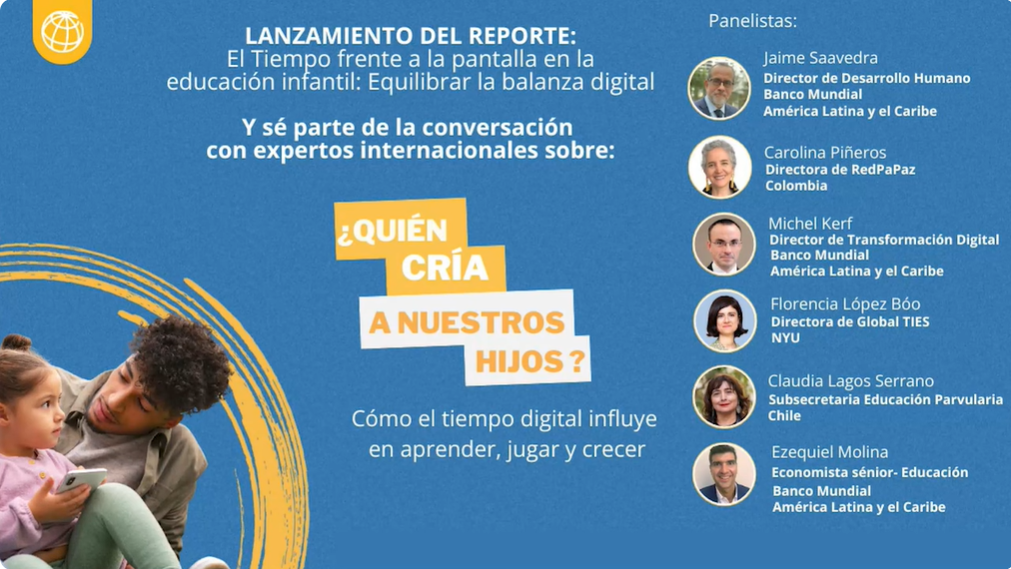Resources
Webinar en Español: “Quién cría a nuestros hijos, cómo el tiempo digital influye en aprender, jugar y crecer”
On January 9, 2026, our Director, Florencia Lopez Boo, joined a World Bank panel discussion “Quién cría a nuestros hijos, cómo el tiempo digital influye en aprender, jugar y crecer” as part of their broader initiative on early childhood education and digital environments, aiming to ground public debate and policy decisions in research rather than fear, hype, or one-size-fits-all prescriptions. Florencia Lopez Boo contributed an evidence-based perspective on young children’s learning and development in increasingly digital contexts.
The event convened researchers and policy leaders to examine how digital exposure is reshaping early childhood at home, in education systems, and across broader care environments in Latin America and the Caribbean.
The recording of the webinar “Quién cría a nuestros hijos, cómo el tiempo digital influye en aprender, jugar y crecer,” organized by The World Bank, is now available online.
Florencia Lopez Boo presented at an event on Neuroscience and Education for the Future: Challenges and Opportunities in the Latin-America Region
On December 9, 2025 our Director, Florencia Lopez Boo, joined “Neurociencia y Educación para el Futuro: Desafíos y oportunidades en la región,” (“Neuroscience and Education for the Future: Challenges and Opportunities in the Latin-America Region”) an event organized by the School of Education at Universidad de 'San Andrés'. Florencia presented about how neuroscience can inform public policies in education and - along with Sebastian J. Lipina, Diego Golembek, and Ezequiel Gomez Caride - contributed to a broader discussion on the challenges and opportunities for the neuroscience of education. The event brought together teachers, school directors, scholars and practitioners examining how neuroscience can inform education systems across Latin America. In her remarks, she noted that while nudges opened the door for behavioral science in policymaking, a neuroscientific approach represents a deeper shift in how policy can improve people’s lives. We are grateful to UDESA for convening this timely conversation and for inviting Global TIES for Children to engage with colleagues across the region on the future of education.
Florencia Lopez Boo presented at the IDB Regional Policy Dialogue: Transforming Early Childhood Development in Latin America & Caribbean
Florencia Lopez Boo presented at the 2025 Inter-American Development Bank Regional Policy Dialogue: "Childhood, Innovation, Impact: Transforming Early Childhood Development in Latin America and the Caribbean (LAC)" in Mexico City.
More than 100 participants, including authorities from 17 LAC countries, donors, civil society, and academics.
Wonderful speakers and panelists such as Susan Walker, Mariano Bosch Mossi, Marta Rubio-Codina, Carolina Freire, Romina Tome, Alexandre Bagolle, Claudia Vazquez, Jorge Gaete, Filipa de Castro, Eunice Deras, Andrés Moya, among many others.
Tremendous master lecture by James Cairns.
And a first-class closure of the "Child Development Innovation Fund."
Not only was it motivating to discuss the challenges of Latin America in the coming years, it was also nice to catch up with the Haiti and Argentina teams whom we are working on border agendas, and to see so many dear friends and colleagues. Congratulations to the Pablo Ibarraran team and the Inter-American Development Bank for this unique space for reflection.
Florencia Lopez Boo, Orazio Attanasio, Diana Perez-Lopez, Sarah Anne Reynolds, published an article discussing inequality in early childhood development in Latin America
Gaps in child development by socio-economic status (SES) start early in life, are large and can increase inequalities later in life. We use recent national-level, cross-sectional and longitudinal data to examine inequalities in child development (namely, language, cognition and socio-emotional skills) of children 0–5 in five Latin American countries (Chile, Colombia, Mexico, Peru and Uruguay). In the cross-section analysis, we find statistically significant gaps with inequality patterns that widely differ across countries. For instance, gaps in language and cognition for Uruguay and Chile are much smaller than those for Colombia and Peru. When turning to the longitudinal data, average SES gaps are similar to those of the cross-section in language but differ substantially in cognition, mainly in Uruguay where they emerge as more unequal when cohort effects do not operate. Importantly, we also find that the ECD gaps found at early ages (0–5) still manifest 6–12 years later in almost all locations and realms in which we have measures of early child development, but they do not increase with age. Results are robust to using different measures of inequality (income and maternal education). Gaps are smaller but generally remain when adjusting for possible explanatory factors (e.g. family structure, parental education, geographic fixed effects). To reduce ECD inequality and promote equality in later life outcomes, policymakers should look to implementing evidence-based interventions at scale to improve developmental outcomes of the most disadvantaged children in society.
Experimental impacts of a teacher professional development program in Chile on preschool classroom quality and child outcomes.
We assessed impacts on classroom quality and on 5 child language and behavioral outcomes of a 2-year teacher professional-development program for publicly funded prekindergarten and kindergarten in Chile. This cluster-randomized trial included 64 schools (child N 1,876). The program incorporated workshops and in-classroom coaching. We found moderate to large positive impacts on observed emotional and instructional support as well as classroom organization in prekindergarten classrooms after 1 year of the program. After 2 years of the program, moderate positive impacts were observed on emotional support and classroom organization. No significant program impacts on child outcomes were detected at posttest (1 marginal effect, an increase in a composite of self-regulation and low problem behaviors, was observed). Professional development for preschool teachers in Chile can improve classroom quality. More intensive curricular approaches are needed for these improvements to translate into effects on children.






